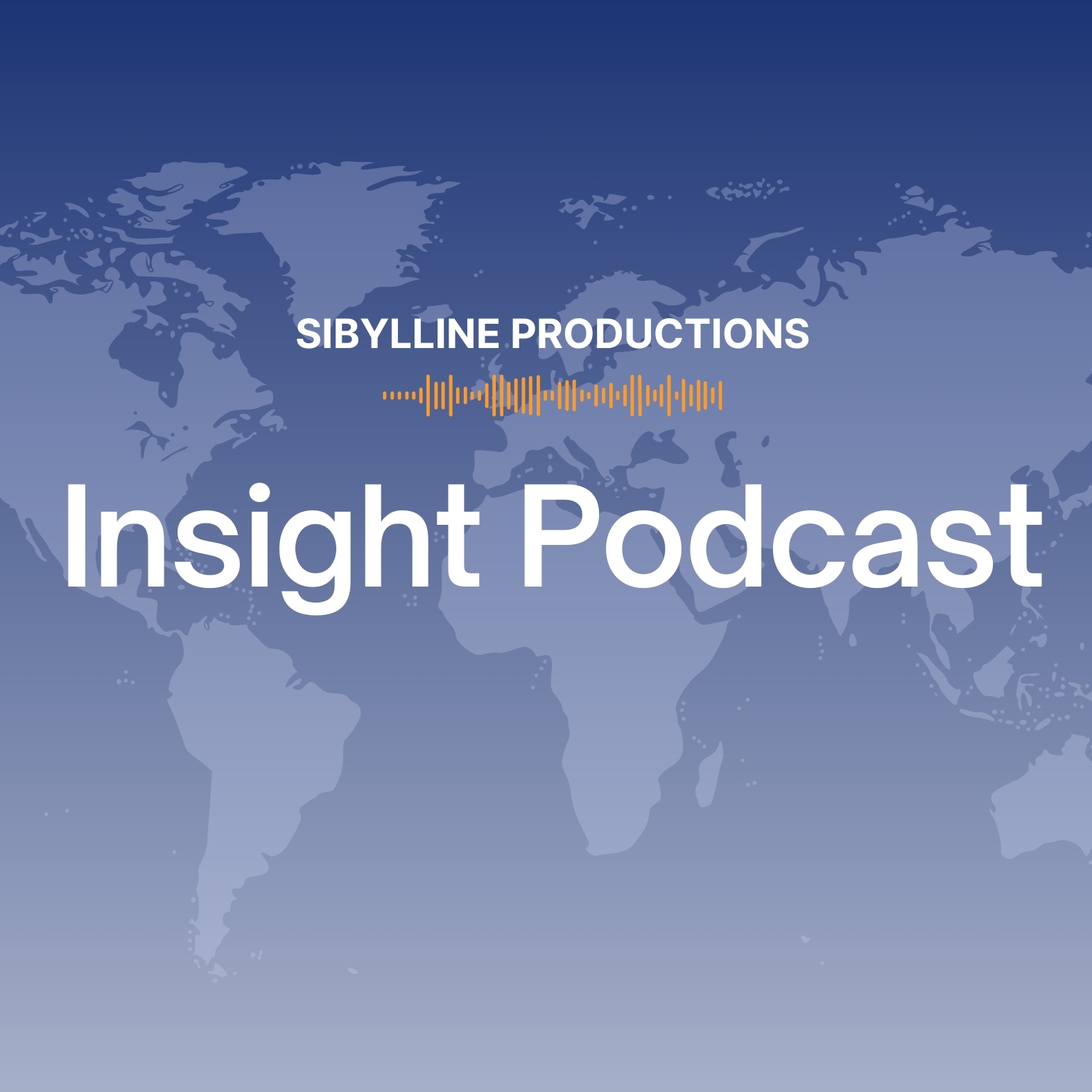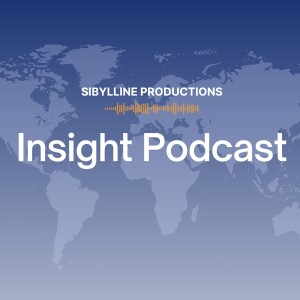
26.7K
Downloads
169
Episodes
Welcome to Sibylline Insight, the podcast where we delve into the intricate world of global intelligence and geopolitics. Join our hosts as they sit down with members of the Global Intelligence Team to provide in-depth analysis and context to the most pressing geopolitical developments of our time. Each episode features long-form interviews that unravel the complexities behind current events, offering listeners a unique perspective on international affairs. Whether you’re a seasoned analyst or simply curious about the forces shaping our world, Refined Insight promises to inform, enlighten, and engage. Tune in for thought-provoking conversations, expert opinions, and comprehensive insights that go beyond the headlines. Welcome to a deeper understanding of global dynamics with Sibylline Insight.
Episodes

Friday Aug 06, 2021
Friday Aug 06, 2021
Join your host Liana Semchuk, Lead Europe & Eurasia Analyst, along with Louis Cox-Brusseau and Zsofia Wolford our Europe Analysts to discuss the ongoing tensions between Hungary, Poland and the European Commission.
Tensions increased recently as the Commission initiated legal proceedings against Hungary over a controversial anti-LGBTQI+ law. This comes as revelations from the Pegasus surveillance scandal suggested independent media and opposition figures in Hungary were overwhelmingly targeted by state surveillance.
Elsewhere in the Visegrad region, concerns remain over the independence of the judiciary in Poland and media freedoms in the Czech Republic, ensuring that tensions with Brussels are set to increase in the long term.

Friday Jul 30, 2021
Mounting Political Crisis Threatens Tunisia's Democracy
Friday Jul 30, 2021
Friday Jul 30, 2021
Join this week’s host, Alex Parsons, Lead Analyst of the Americas, along with Eloise Scott, Lead Analyst for the Middle East and Africa, and Rhiannon Phillips, Associate Analyst for the Middle East and North Africa to discuss Tunisia's deepening political deadlock, which has recently come to a head, with President Kais Saied dismissing Prime Minister Hichem Mechichi and suspending parliament.
The impact this governmental crisis has on the already stagnant policy will be significant, as Tunisia faces fresh waves of Covid-19 infections and mounting socio-economic strife. President Saied's actions could also threaten Tunisia's democracy, with the 2014 constitution at the heart of the crisis.

Friday Jul 23, 2021
Socio-economic unrest threatens to disrupt South Africa's recovery
Friday Jul 23, 2021
Friday Jul 23, 2021

Friday Jul 16, 2021
Friday Jul 16, 2021
US President Joe Biden is expecting a 45-day update on a US investigation into the origins of the Covid-19 pandemic. The investigation, led by the US intelligence services, is drawing widespread media attention, with scientists, political scientists and health experts weighing in on the polarising hypothesis of whether the SARS-CoV-2 virus may have leaked from the Wuhan Institute of Virology in China.
While evidence to support the lab leak theory remains purely circumstantial, the US investigation comes amid strained relations between Beijing and Washington, particularly as the Biden Administration considers further actions in response to Beijing’s crackdown on the pro-democracy movement in Hong Kong, and its treatment of Uyghur Muslims in Xinjiang.
How may Washington's virus origin investigation shape the direction of travel for already fraught Sino-US relations? With Covid-19 still affecting much of the world, how will the ongoing feud between the two world's largest economies affect our response to this and future pandemics?
Join your host Justin Crump, CEO of Sibylline, along with Guo Yu, our Lead Analyst for Asia-Pacific and resident China expert, James Hannan, our Americas Analyst and avid Covid-watcher, and John Breen, Lead Analyst for Global Risks.

Friday Jul 09, 2021
Concerns Surrounding the Tokyo 2020 Olympic Games
Friday Jul 09, 2021
Friday Jul 09, 2021
With less than 15 days to go to the start of the Tokyo 2020 Olympic Games, the Japanese capital has been placed under a fourth state of emergency amid a fresh surge of Covid-19 infections. The ever-changing pandemic situation has characterised the uncertainty that has shrouded this flagship sporting event, having been already postponed once and attracted notable opposition among the Japanese public. This week's podcast discusses the political and security dynamic concerning the upcoming Tokyo Olympics with your host, Amy Reynolds, along with Hans Horan, Asia-Pacific Analyst and Dr Guo Yu, Lead Asia-Pacific Analyst.

Friday Jul 02, 2021
Security Tensions in Colombia
Friday Jul 02, 2021
Friday Jul 02, 2021
In recent weeks, a car-bomb attack against an army base hosting US military personnel and an apparent attempt to assassinate President Iván Duque Márquez have raised concerns over the security environment in Colombia. Meanwhile, the country has also witnessed a surge in violent protests in Bogotá and several other cities. In this week's podcast, we discuss the latest security situation in Colombia and assess how it may pan out heading into 2022.

Thursday Jun 24, 2021
Regional Elections in France
Thursday Jun 24, 2021
Thursday Jun 24, 2021
The first round of regional elections in France has yielded startling results, with both the far-right under Marine Le Pen and the ruling party of President Emmanuel Macron seeing significant setbacks nationwide as traditional left- and right-wing parties surge forward. In our latest podcast, Liana Semchuk, Lead Europe-Eurasia Analyst, is joined by Louis Cox-Brusseau, Europe Analyst, and Alex Lord, Europe-Eurasia Analyst. Together they assess the preliminary results of the French regional elections, ahead of an electoral runoff next week which is likely to prefigure a close race in the French presidential elections in 2022.

Monday Jun 21, 2021
Presidential Elections in Iran
Monday Jun 21, 2021
Monday Jun 21, 2021
In our latest podcast, Alex Parsons, Lead Analyst for the Americas is joined by Eloise Scott, Lead Analyst for the Middle East and Africa and James Hannan, Associate Analyst for Americas, to discuss the presidential elections in Iran.
Iranian elections held on 18 June are almost certain to return a hard-line president, allowing hardliners and conservatives to consolidate their power over the country and its institutions. This podcast explores how the polls might affect Iran's internal affairs and ongoing nuclear talks with the other JCPOA signatories and wider regional dynamics.

Friday Jun 11, 2021
The G7 Summit: Politics, Policy and Possible Implications
Friday Jun 11, 2021
Friday Jun 11, 2021
In our latest podcast, Philip Riding, Middle East and Africa Lead Analyst is joined by James Barth, North America Analyst and Dr Guo Yu, Lead Analyst for Asia Pacific, to discuss the G7 Summit in Cornwall.
Leaders of the world's wealthiest economies and major democratic powers (including the EU) have gathered at Cornish seaside town of St. Ives for the 47th summit, which kicks off today. The three-day meeting – US President Joe Biden’s first official foreign trip since his inauguration in January – represents one of the most high-profile events in diplomacy to be held in person since the start of the pandemic. The summit, therefore, serves as an opportunity for the leading advanced economies to discuss important plans and strategy that will undoubtedly have a lasting impact on the post-pandemic world order.

Thursday Jun 03, 2021
Federal Elections in Mexico
Thursday Jun 03, 2021
Thursday Jun 03, 2021
The federal elections on 6 June will be the second-largest electoral event in Mexico’s history. Over 20,000 positions will be elected, including the entire lower chamber of the 500-seat Congress, 15 state governors, 30 State congresses, and the authorities of around 1,900 municipalities. Together with Ignacio Ayala, Lat-Am Intelligence Analyst, Alex Parsons, Lead Analyst, the Americas, and Dr Guo Yu, Lead Analyst, Asia Pacific, discuss the significance of the vote, the recent surge of political violence as well as what the likely outlook of Mexico’s political landscape means for business.
